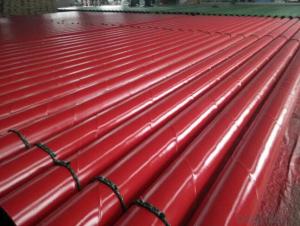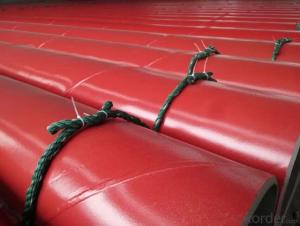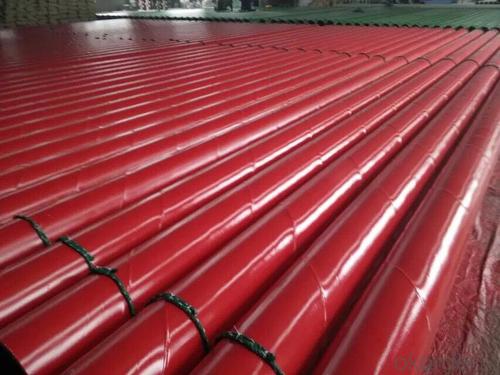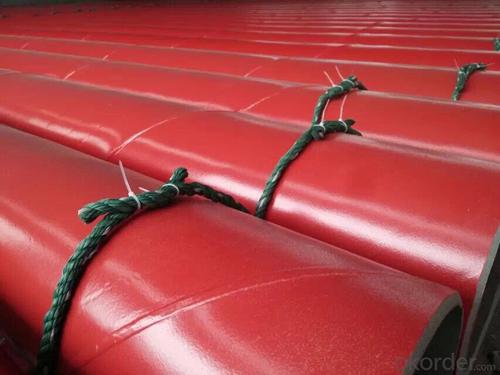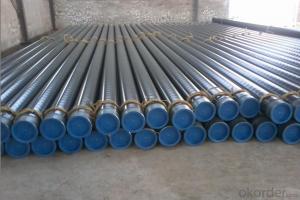SMLS 3PE steel pipe external coating
- Loading Port:
- China Main Port
- Payment Terms:
- TT OR LC
- Min Order Qty:
- -
- Supply Capability:
- -
OKorder Service Pledge
OKorder Financial Service
You Might Also Like
Specifications
water pipeline inner-layer tape
1 Butyl rubber as adhesive
2. SGS test report and DVGW certificate
3. corrosion protection
water pipeline inner-layer tape
State-of-the-Art Pipeline Protection for All Climates & Environments
System description:
WATER PIPELINE Inner -layer tape also be called pipe wrap anti-corrosion tape, polyethylene wrap tape.
water pipeline Inner-layer tapeT100 is engineered to assure a high bond to the primed pipe surface with excellent conformability characteristics, aggressive adhesive for corrosion protection and repair of main line coatings.
Inner-layer tapeT100 series is cold applied tape coating system for corrosion protection of Oil, Gas, Petrochemical, and Waste Waterburied pipeline, pipe can be buried, also can be underground ,overhead ,onshore and offshore .
Structure of water pipeline inner wrap tape
The specification of the tape consists of two layers, adhesive layer and film backing
Adhesive: butyl rubber
Film backing: Special blend of stabilized polyethylene
Features & Benefits
Provides a permanent bond to the primed steel pipes surface and provides protection against chemical electrolytic corrosion for underground pipelines.
long term corrosion protection
Worldwide reference lists. Established in-ground history
High chemical resistance under service temperature.
Outstanding electric property and permanent adhesion.
Cold applied, No release liner. Makes installation fast and easy.
Complies with EN-DIN 30672 and AWWAC-214 international standards and also ASTM standards.
Be used for water pipeline corrosion protection
System Properties
Type | T138 | T 150 | T165 | T180 | T 250 | T265 | T280 | |
Thickness | 15mil 0.38mm | 20mil 0.508mm | 25mil 0.635mm | 30mil 0.762mm | 20mil 0.508mm | 25mil 0.635mm | 30mil 0.762mm | |
Backing | 9mil 0.229mm | 9mil 0.241mm | 10mil 0.25mm | 10mil 0.25mm | 15mil 0.38mm | 20mil 0.508mm | 25mil 0635mm | |
Adhesive | 6mil 0.152mm | 11mil 0.279mm | 15mil 0.381mm | 20mil 0.508mm | 5mil 0.127mm | 5mil 0.127mm | 5mil 0.127mm | |
When used for ductile iron pipes inner layer 980-20 or 980-25 and outer layer 955-20 or 955-25 are recommended. | ||||||||
Elongation | ³300% | ³400% | ||||||
Tensile Strength | 55 N/cm | 70 N/cm | ||||||
Color | Black | White | ||||||
Peel Adhesion to Primed Pipe | 33 N/cm | |||||||
Dielectric Strength | 30 KV | |||||||
Dielectric Breakdown | 26 KV/mm | |||||||
Cathodic Disbandment | 0.24 in radius 6.4 mm | |||||||
Water Vapor Transmission Rate | < 0.1% | |||||||
Volume Resistivity | 2.5 x 1015 ohm.cm | |||||||
Impact resistance | 5.5Nm | |||||||
Penetration Resistance | <15% | |||||||
Performance | AWWA C-209,ASTM D 1000,EN 12068 | |||||||
Order information
Length | 100ft(30 M),200ft(60 M),400ft(120 M),800ft(240 M) |
Width | 2’’(50mm),4’’(100mm),6’’(150mm),17’(450mm),32’’(800mm) |
- Q: How are steel pipes used in the infrastructure development?
- Steel pipes are widely used in infrastructure development as they provide strength, durability, and versatility for various applications. They are commonly used in the construction of bridges, highways, and buildings as structural elements. Steel pipes are also used in water and sewage systems, as they have excellent corrosion resistance and can withstand high pressure. Additionally, steel pipes are used for transporting oil, gas, and other fluids, making them crucial for the energy industry. Overall, steel pipes play a vital role in the development and maintenance of infrastructure, ensuring its stability and functionality.
- Q: How are steel pipes tested for mechanical strength?
- Steel pipes are tested for mechanical strength through various methods such as tensile testing, hydrostatic testing, and non-destructive testing. Tensile testing involves pulling the pipe until it breaks to measure its ultimate tensile strength. Hydrostatic testing involves pressurizing the pipe with water to check its ability to withstand high internal pressures. Non-destructive testing methods like ultrasonic testing or magnetic particle inspection are also used to detect any defects or weaknesses in the pipe without causing damage. These tests ensure that steel pipes are strong enough to withstand the required mechanical stresses.
- Q: Can steel pipes be used for roller coaster tracks?
- Yes, steel pipes can be used for roller coaster tracks. Steel is a commonly used material for roller coaster tracks due to its strength, durability, and ability to withstand intense forces and high speeds.
- Q: How are steel pipes used in the construction of geothermal power plants?
- Steel pipes are used in the construction of geothermal power plants primarily for two purposes: transporting geothermal fluids and ensuring the structural integrity of the plant. The pipes are used to extract hot water or steam from the geothermal reservoir deep underground and transport it to the surface. These pipes are designed to withstand high temperatures and pressures associated with geothermal fluids. Additionally, steel pipes are also used to distribute the extracted fluids to various parts of the power plant for electricity generation. Moreover, steel pipes are utilized in the construction of the plant's infrastructure, such as the framework, supports, and other structural components, ensuring the overall stability and durability of the geothermal power plant.
- Q: What are the different methods of non-destructive testing for steel pipes?
- There are several methods of non-destructive testing for steel pipes, including ultrasonic testing, magnetic particle testing, liquid penetrant testing, radiographic testing, and eddy current testing. These methods help to detect any defects or anomalies in the pipes without causing any damage, ensuring their structural integrity and reliability.
- Q: How are steel pipes used in fire protection systems?
- Steel pipes are an integral part of fire protection systems, primarily used for the distribution of water or other fire suppressants in buildings. These pipes are known for their strength, durability, and resistance to high temperatures, making them ideal for withstanding the intense conditions of a fire. In fire protection systems, steel pipes are commonly used to create a network of pipes that deliver water to sprinkler heads or fire hydrants throughout a building. This network ensures that water is readily available to suppress or extinguish a fire in case of an emergency. One of the key advantages of steel pipes in fire protection systems is their ability to withstand the high pressure and flow rates required for effective fire suppression. Steel pipes can handle the forceful water flow needed to quickly and efficiently distribute water to the affected areas, helping to control and extinguish the fire as soon as possible. Additionally, steel pipes are resistant to corrosion, which is essential for maintaining the integrity of the fire protection system over time. Corrosion can weaken pipes, leading to leaks or even complete failure, which can be catastrophic in a fire situation. Steel pipes, however, have a longer lifespan and require less maintenance compared to other pipe materials, ensuring the system remains reliable and functional for years to come. Furthermore, steel pipes are often used in fire protection systems due to their fire resistance properties. Steel is inherently fire-resistant, meaning it can withstand high temperatures without deforming or losing its structural integrity. This is crucial in fire protection systems as it allows the pipes to remain intact and continue delivering water even in the midst of a fire, ensuring the safety of occupants and minimizing damage to the building. In summary, steel pipes play a vital role in fire protection systems by ensuring a reliable and efficient distribution of water or fire suppressants. Their strength, durability, resistance to high temperatures, and corrosion resistance make them an ideal choice for effectively combating fires and safeguarding lives and property.
- Q: How are steel pipes used in the manufacturing of agricultural machinery?
- Steel pipes are commonly used in the manufacturing of agricultural machinery as they are strong, durable, and resistant to corrosion. They are used to create the framework and structural components of various agricultural equipment such as plows, tillers, planters, and harvesters. Steel pipes provide stability and strength to these machines, allowing them to withstand heavy loads and operate efficiently in tough farming conditions.
- Q: Are steel pipes suitable for wastewater pumping stations?
- Yes, steel pipes are suitable for wastewater pumping stations. Steel pipes are known for their durability and strength, making them an excellent choice for handling the harsh conditions and high-pressure requirements of wastewater pumping stations. They have the ability to withstand the corrosive nature of wastewater and can resist damage caused by chemicals and other aggressive substances commonly found in wastewater. Additionally, steel pipes are available in various sizes and thicknesses, allowing for customization to meet the specific needs of the pumping station. Furthermore, steel pipes can be easily welded and joined together, ensuring a secure and leak-free system. Overall, steel pipes offer a reliable and long-lasting solution for wastewater pumping stations.
- Q: What are the applications of galvanized steel pipes?
- Galvanized steel pipes have numerous applications in various industries. They are commonly used for plumbing and water supply systems due to their corrosion resistance. Additionally, they are used in gas transmission, oil refineries, and industrial plants where resistance to harsh chemicals and high temperatures is crucial. Galvanized steel pipes are also employed in construction for structural support and scaffolding, as well as for fencing and handrails. Overall, their durability, strength, and cost-effectiveness make galvanized steel pipes suitable for a wide range of applications.
- Q: How does the price of steel pipes fluctuate?
- The price of steel pipes fluctuates due to various factors, including changes in raw material costs, supply and demand dynamics, global economic conditions, and market competition. Fluctuations in the price of steel, which is a key component in pipe manufacturing, directly impact the cost of steel pipes. Additionally, shifts in demand for steel pipes in industries such as construction, oil and gas, and automotive can also influence their pricing. Market conditions, such as trade policies and geopolitical factors, can further contribute to price fluctuations. Therefore, the price of steel pipes is subject to constant change, driven by a combination of these factors.
Send your message to us
SMLS 3PE steel pipe external coating
- Loading Port:
- China Main Port
- Payment Terms:
- TT OR LC
- Min Order Qty:
- -
- Supply Capability:
- -
OKorder Service Pledge
OKorder Financial Service
Similar products
Hot products
Hot Searches
Related keywords
